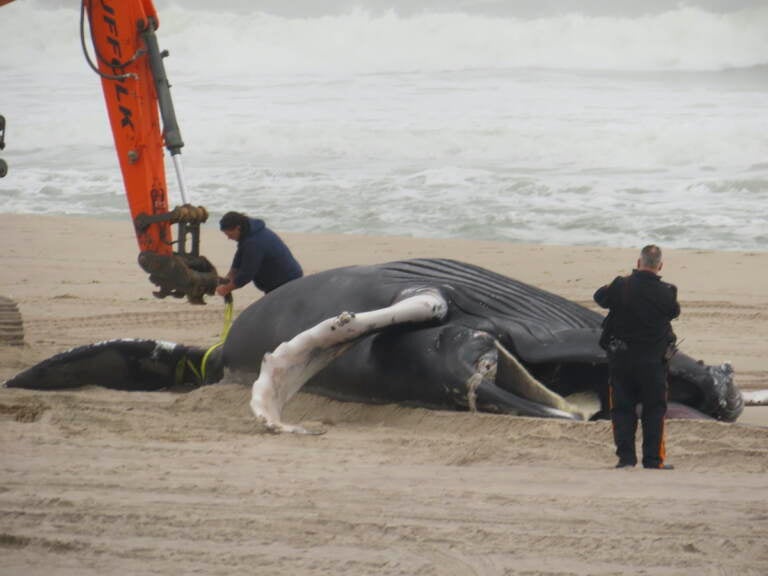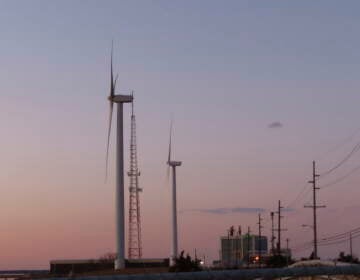GOP congressmen: Halt offshore wind, probe whale deaths
Thursday's hearing in Wildwood could be the beginning of an expected campaign by the GOP-controlled House to investigate the Biden administration’s clean energy plans.

A dead humpback whale lies on the beach in Seaside Park, N.J., on March 2, 2023. Republican Congressmen on Thursday, March, 16, 2023, called for a halt to all offshore wind power projects amid a spate of whale deaths on the U.S. East Coast in what could be the beginning of an expected campaign by the GOP-controlled house to investigate the Biden Administration's clean energy plans. (AP Photo/Wayne Parry)
Republican congressmen called Thursday for a halt to all offshore wind power projects amid a spate of whale deaths on the U.S. East Coast in what was likely the beginning of an expected investigation by the GOP-controlled House into the Biden administration’s clean energy plans.
Reps. Jeff Van Drew and Christopher Smith, of New Jersey; Andy Harris, of Maryland; and Scott Perry, of Pennsylvania, held a hearing on the boardwalk in Wildwood near where New Jersey has authorized three offshore wind farms, with more to come.
The hearing came as 29 whales have died on the East Coast since Dec. 1.
Opponents of offshore wind, elected officials — most of them Republicans — and several community groups say they believe that preparatory work on the ocean floor has been responsible for the whale deaths, even though three federal and one state agency say there is no evidence that the two are related.
Van Drew said that because President Joe Biden, New Jersey Gov. Phil Murphy and offshore wind companies “refuse to share the facts with Americans, Congress must do its job.”
Smith, who represents parts of the Jersey Shore, was among those calling for a pause on wind farm preparation until the U.S. Government Accountability Office can investigate the “sufficiency of the environmental review processes for offshore wind projects.”
“They all say there’s no evidence,” Smith said. “You’re not even looking!”
Harris used the theoretical example of a dog spooked by fireworks that runs into a creek and drowns. A veterinarian would say the dog’s cause of death was drowning. But Harris said the true cause of death would be the noise that prompted it to run into the creek.
And Perry said, “I get that the administration wants to rush this forward. But this is our country, and we’re in charge here. Look: The lights are on right now, without these turbines out in the ocean.”
Lauren Gaches, a spokesperson for the National Oceanic and Atmospheric Administration, said there is no evidence “to support speculation” that noise resulting from offshore wind site work is killing whales, adding the agency will continue to study the matter.
About half of the 29 recorded dead whales were determined to have been struck by ships or entangled in fishing gear, Gaches’ agency said.
Environmental and pro-wind groups who were not invited to testify at the hearing issued statements supporting offshore wind and decrying falsehoods that Jason Grumet, CEO of the American Clean Power Association, said are being spread by “long-time opponents to offshore wind and irresponsible news outlets who have blamed these deaths on the offshore wind industry without any evidence.”
“Disinformation shouldn’t dictate policy,” he said. “The evidence is clear: There’s no link between offshore wind and recent tragic whale strandings.”
Most established environmental groups in New Jersey support offshore wind and say climate change spurred by the continued burning of fossil fuels is the real threat to whales and other marine life.
“Unlike what Van Drew and others would like you to believe, clean, renewable energy — like wind power in New Jersey — offers an unmissable opportunity to end our dependence on polluters for power,” said Anjuli Ramos-Busot, New Jersey director of the Sierra Club. “Our dependence on fossil fuels for power, not renewables, put wildlife and coastal communities at risk.”
The New Jersey Department of Environmental Protection joined this week the growing list of government agencies that have found no link between offshore wind preparation and whale deaths.
“Facts matter, and based on them, there is no reason to conclude that recent whale mortality in New Jersey is attributable to offshore wind-related activities,” said Shawn LaTourette, the state environmental protection commissioner.
Van Drew cited a recent letter from a Bureau of Ocean Energy Management scientist to the agency warning of dangers to whales from offshore wind.
“This is their own scientist warning BOEM that offshore wind will severely impact the whales, yet they moved ahead and completely ignored the few people in their group who would tell the truth,” VanDrew said.
Gaches, the National Oceanic and Atmospheric Administration spokesperson, said her agency and the Bureau of Ocean Energy Management “recognize this development must be undertaken responsibly.”
WHYY is your source for fact-based, in-depth journalism and information. As a nonprofit organization, we rely on financial support from readers like you. Please give today.






